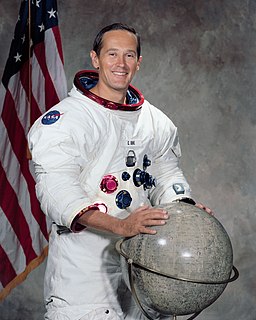A Quote by Nikola Tesla
No rocket will reach the moon save by a miraculous discovery of an explosive far more energetic than any known. And even if the requisite fuel were produced, it would still have to be shown that the rocket machine would operate at 459 degrees below zero-the temperature of interplanetary space.
Related Quotes
The expense of getting into space is the rocket launch, the rocket itself. Rocket's right now, commercial rockets cost probably somewhere between $50, or $120, or $150 million per launch. And those are all expendable. That is, you've got to buy a new rocket for each launch. So, that really is the critical part. If there was some kind of really, a revolutionary breakthrough and the price of rockets fell by an order of magnitude, I mean, just imagine what that would do as far as getting access to more ordinary people.
What would happen if the moon were not there? Then our tilt could swing wildly over a large range, resulting in major temperature swings. If our tilt were more like ninety degrees, the north pole would be exposed to the sun for six months, while the south pole would be in darkness, then vice-versa. Instead, it varies by only about one and a half degrees - just a tiny variation, because the gravity from the moon's orbit keeps it stabilized.
For me, a rocket is only a means--only a method of reaching the depths of space--and not an end in itself... There's no doubt that it's very important to have rocket ships since they will help mankind to settle elsewhere in the universe. But what I'm working for is this resettling... The whole idea is to move away from the Earth to settlements in space.
The first man-made satellite to orbit the earth was named Sputnik. The first living creature in space was Laika. The first rocket to the Moon carried a red flag. The first photograph of the far side of the Moon was made with a Soviet camera. If a man orbits the earth this year his name will be Ivan.
On Apollo 11 in route to the Moon, I observed a light out the window that appeared to be moving alongside us. It was either the rocket we had separated from, or the 4 panels that moved away when we extracted the lander from the rocket and we were nose to nose with the two spacecraft. So in the close vicinity, moving away, were 4 panels. And i feel absolutely convinced that we were looking at the sun reflected off of one of these panels.
Indeed the early history of rocket design could be read as the simple desire to get the rocket to function long enough to give an opportunity to discover where the failure occurred. Most early debacles were so benighted that rocket engineers could have been forgiven for daubing the blood of a virgin goat on the orifice of the firing chamber.
With space travel, [it's] no different. You know, in 1990 I read the name Virgin Galactic Airways. Loved the name. And set out to try to find an engineer or rocket scientist in the world who could build a safe, reusable rocket that could take people to and from space and we could start a whole new era of commercial space travel.





































